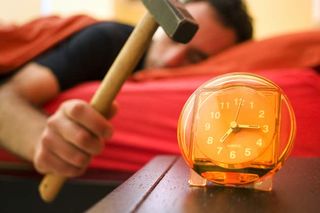Afternoon Naps Protect Your Heart, Study Finds

It might be smart to let your heavy eyelids carry you into dreamland during waking hours, because a new study finds that half-hour siestas can boost heart health and help prevent deadly cardiovascular disease.
Past studies have indicated that in countries where midday naps are common, as in the Mediterranean and parts of Latin America, rates of death from heart disease are lower than the average rates in non-napping regions.
Few of these studies, however, accounted for factors linked to heart disease risk, including physical activity, diet and age.
- Video: Why We Age
Androniki Naska of the University of Athens Medical School in Greece and colleagues studied 23,681 Greek men and women between age 20 and 86 who had clean bills of health when they enrolled into the study between 1994 and 1999. The scientists conducted follow-up exams at various intervals until the end of December 2005, with an average of six years between enrollment and follow-up.
Participants reported whether they took siestas and if so, the frequency and length of their naps. They also indicated their level of physical activity and dietary habits over the previous year.
After roughly six years, 792 participants had died, including 133 deaths from heart disease. Those who took naps at any frequency or duration were 34 percent less likely to die from heart disease than the non-nappers. The serious snoozers who took a 30-minute or longer siesta at least three times a week had a 37 percent lower risk of heart-disease death.
Working men showed the greatest heart benefits from daily shut-eye, no matter the number or duration of naps, with a 64 percent lower risk of death from heart disease compared with working men who didn't nap. Non-working men who napped were 36 percent less likely to die from heart disease. Only six working women died during the study, so the researchers couldn't run a similar analysis for women.?
Sign up for the Live Science daily newsletter now
Get the world’s most fascinating discoveries delivered straight to your inbox.
The authors suggest naps could boost heart health via stress reduction. Past studies have linked job stress with myriad health ailments, including heart disease, flu virus, high blood pressure and diabetes.
The fact that naps gave a heightened benefit to working men--who likely face job-related stress--compared with non-working men supports the stress-reduction link, they say in their study published in the Feb. 12 issue of the journal Archives of Internal Medicine.
- The Odds of Dying
- Video: Why We Age
- Top 10 Amazing Facts About Your Heart
- Sleep Deprivation: The Great American Myth
- Top 10 Mysteries of the Mind
- Why Do We Snore?

Jeanna served as editor-in-chief of Live Science. Previously, she was an assistant editor at Scholastic's Science World magazine. Jeanna has an English degree from Salisbury University, a master's degree in biogeochemistry and environmental sciences from the University of Maryland, and a graduate science journalism degree from New York University. She has worked as a biologist in Florida, where she monitored wetlands and did field surveys for endangered species. She also received an ocean sciences journalism fellowship from Woods Hole Oceanographic Institution.
